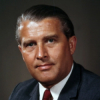Wernher von Braun

Wernher von Braun
Wernher Magnus Maximilian Freiherr von Braunwas a German, later American, aerospace engineer and space architect credited with inventing the V-2 rocket for Nazi Germany and the Saturn V for the United States. He was one of the leading figures in the development of rocket technology in Nazi Germany, where he was a member of the Nazi Party and the SS. Following World War II, he was moved to the United States, along with about 1,500 other scientists, technicians, and engineers,...
NationalityGerman
ProfessionScientist
Date of Birth23 March 1912
CityWyrzysk, Poland
CountryGermany
By the year 2000 we will undoubtedly have a sizable operation on the Moon, we will have achieved a manned Mars landing and it's entirely possible we will have flown with men to the outer planets.
If we were to start today on an organized and well-supported space program I believe a practical passenger rocket can be built and tested within ten years.
There are flying grandfathers. But I intend to be an orbiting grandfather.
My friends they were dancing here in the streets of Huntsville when our first satellite orbited the Earth. They were dancing again when the first Americans landed on the Moon. I'd like to ask you, don't hang up your dancing slippers.
Development of the space station is as inevitable as the rising of the sun; man has already poked his nose into space and he is not likely to pull it back . . . . There can be no thought of finishing, for aiming at the stars-both literally and figuratively-is the work of generations, and no matter how much progress one makes, there is always the thrill of just beginning.
The first men who set out for Mars had better make sure they leave everything at home in apple-pie order. They won't get back to earth for more than two and a half years. The difficulties of a trip to mars are formidable. . . . What curious information will these first explorers carry back from Mars? Nobody knows-and its extremely doubtful that anyone now living will ever know. All that can be said with certainty today is this: the trip will be made, and will be made . . . someday.
With our present knowledge, we can respond to the challenge of stellar space flight solely with intellectual concepts and purely hypothetical analysis. Hardware solutions are still entirely beyond our reach and far, far away.
In order for us to use the very best judgment possible in spending the taxpayer's money intelligently, we just have to do a certain amount of this research and development work ourselves. We just have to keep our own hands dirty to command the professional respect of the contractor personnel engaged with actual design, shop and testing work.
Looking back, nothing seems so simple than a utopian vision realised.
Man belongs wherever he wants to go.
What we will have attained when Neil Armstrong steps down upon the moon is a completely new step in the evolution of man.
For my confirmation, I didn't get a watch and my first pair of long pants, like most Lutheran boys. I got a telescope. My mother thought it would make the best gift.
It is in scientific honesty that I endorse the presentation of alternative theories for the origin of the universe, life and man in the science classroom. It would be an error to overlook the possibility that the universe was planned rather than happening by chance.
Everybody knows what the moon is, everybody knows what this decade is, and everybody can tell a live astronaut who returned from the moon from one who didn't